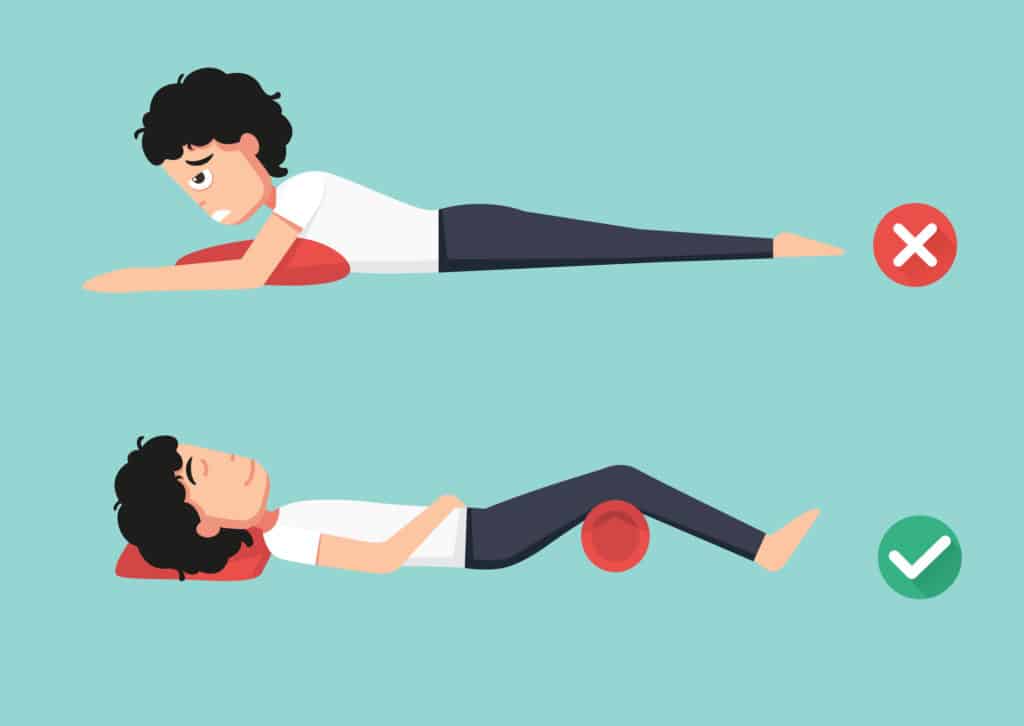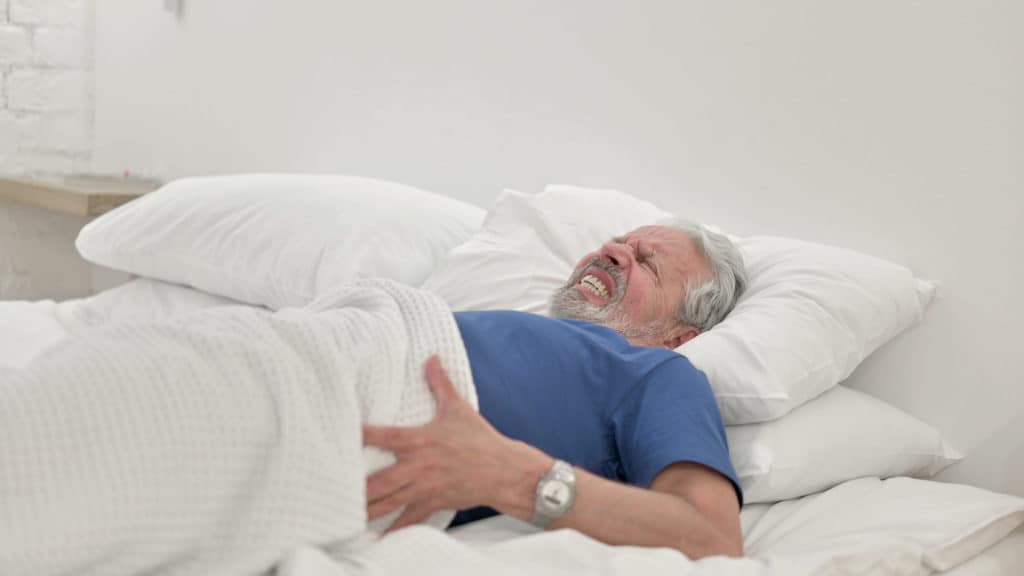Is chronic back pain keeping you awake at night?
We feel your pain.
As if back pain wasn’t bad enough during the day, it morphs into a whole new beast after dark.
During waking hours, you try to distract yourself from the pain, keeping busy – as they say.
In most cases, combined with pain relief, it works to a certain extent. The pain is always there, but you manage to keep your brain from amplifying it with attention. But almost all pain worsens as the day progresses, and your body grows tired. So, there’s that too.
Then when you finally lay in bed ready to get the rest, you need to face the big day ahead for you tomorrow; there is nothing to do but sleep.
Conversely, however, there is nothing to distract you from the pain and discomfort.
Instead, your brain starts to focus on the pain, which makes it worse, and you can’t get to sleep. An hour passes—two hours pass. And to compound the pain, your brain starts to worry about not getting enough sleep.
You begin playing through worse-case scenarios in your brain that you’ll mess up the big presentation you have at work. You’ll fail that exam or have an awful time at the social event you’ve committed to. Before long, your brain has spiraled into panic mode, which keeps you awake even longer – as the pain gets progressively worse.
It’s a bit old vicious circle, and you’re a big, hot mess with bleary eyes who looks like you spent the night propping up the bar doing tequila shots by the time the sun comes up.
“Lack of sleep is only bad if you have to drive, or think, or talk, or move.”
– Dov Davidoff
You wake up low on patience, high on irritability. Pain levels are through the roof, and all you want to do is go back to bed and sleep for a week (if that was even possible). But you have things to do, people to see, commitments to honor, responsibilities to live up to. You gotta’ grit your teeth and get on with it, or give up altogether, right?
Does that sound familiar?
As world-renowned sleep researcher and professor of neuroscience, Matthew Walker Ph.D., says, “The Shorter you sleep, the shorter your life.”
Sleep is super important – for everything if you want to live long and well into old age. It is essential for your day-to-day health and well-being too, particularly your mental health. But it’s vital with chronic pain and the amplification of symptoms and pain severity.
Besides visiting our clinic, our patients tell us that getting a good night’s sleep is the #1 thing that positively affects their pain levels.
“ According to the National Sleep Foundation’s 2015 Sleep in America poll, one in five Americans suffer from chronic pain. A majority of these individuals report substandard sleep quality, and one in four people with chronic pain also have a sleep disorder. Sleep and pain appear to have a bidirectional relationship.”
– Sleep Foundation
When you suffer from back pain, it stops you from sleeping, and then not sleeping causes more back pain. It’s a vicious circle. Sometimes, even getting in and out of bed can trigger discomfort and painful muscle spasms.
So, what can you do about it?
What can you do to improve the quality of your sleep and make sure you’re getting a good 7+ hours every night when you suffer from chronic back pain?
You’ve probably tried every crazy sleep remedy you could find – from banana skin tea and eating a raw onion before bed. (Especially when you’re desperate to fall asleep). Not everything on the internet is rubbish. There is some merit in ideas like clenching and unclenching your toes to relax your body. But it’s best to consult a professional who specializes in pain management instead of taking advice off the internet.
At Intecore Physical Therapy – CA, we specialize in treating chronic back pain (upper back pain, middle back pain, and lower back pain. We take great pride in helping patients who have to live with pain because Doctors and other practitioners have been unable to find an apparent cause.
So, if you’ve been suffering from sleep problems associated with back pain for some time, we encourage you to book a call or complimentary Discovery Visit to get help now. But meanwhile, here are our favorite tips on how to sleep with back pain:
How To Sleep With Back Pain: Strengthen Your Core

One of the best things you can do to support your spine and back muscles and relieve back pain so you can get a better night’s sleep is to strengthen your core muscles. These are the muscles that wrap around the middle of your body and support everything that keeps you upright.
Many people think their “core” is the bit they want to look ripped and toned on the beach: their abs. But your core includes your hips, pelvis, and lower back as well as your abdominal muscles.
We give patients specific exercises to do at home to help strengthen their core. But a good one for you to start with is a simple plank. Start slow and gauge how your body feels. You shouldn’t feel any worsening of symptoms or sharp pain. If you do, stop the exercise right away.
*We would recommend checking with your doctor before embarking on any new exercise routine.
Sleeping With Back Pain: Upgrade Your Mattress

We’d love to say that your mattress doesn’t matter. It can be a significant investment to buy a new one, especially when there isn’t much wrong with your current one – to the untrained eye.
However, it does make a difference to chronic pain symptoms. But one size does not fit all. The right mattress for you could be completely different from what’s good for your neighbors, so don’t run out and buy the mattress that you saw someone raving about on social media. Do your research and find what suits you, your body, and your sleep issues.
People incorrectly assume that you need a good, firm mattress to keep your back straight. Still, if you’re one of the many thousands of Americans that suffer from low back pain, a hard mattress is the worst thing you could buy – and it could make your pain symptoms worse.
But, if you have an old mattress that is now too soft and sinking into the middle, your joints get misaligned, and your pain is made worse.
If you get it wrong, it’s one hell of an expensive mistake (painful too). So, again, we recommend you consult with a professional – who specializes in these types of things to take advice before parting with your hard-earned money.
If you think you might benefit from a firmer mattress, but you can’t afford to upgrade right now, try putting a sheet of inexpensive wood on your bed base to support the worn-out spring or slats on your existing bed. If it helps, great, but if it doesn’t, and you experience worsening symptoms, remove it ASAP.
How To Sleep With Back Pain: Find A Good Sleeping Position

Some sleeping positions can exacerbate your symptoms, whereas others can improve your pain levels dramatically. The key is not to settle for a position that you’re not 100% comfortable with. If you wake up in the morning feeling achy and with worse pain, it suggests you may need to adjust your sleeping position.
We recommend using a pillow between your knees if you sleep on your side or underneath your knees if you prefer to sleep on your back. This extra support can relieve pressure from your back and result in a more restful night’s sleep. For extra comfort and support your body further, you might want to invest in a long maternity pillow.
Everyone has their preferred sleeping position, which is unique to them. But if you’re a stomach sleeper, we would urge you to try sleeping on your back or side instead. Sleeping on your front puts extra pressure on the back – so it’s likely to make your pain symptoms worse and prevent you from getting good quality sleep. But if you really must sleep on your front, try using a pillow underneath your tummy to relieve some of the pressure.
Sleeping With Back Pain: Take Extra Care

If you have severe back pain symptoms, every care should be taken when you get in and out of bed to make sure you don’t twist, strain, or pull anything that could make your symptoms worse.
Take it slow and take extra care not to do anything too acrobatic – like a commando roll into your duvet or getting in or out of bed. Don’t bend too far forward either. If your bed is low to the ground, you may want to consider bringing it raised off the floor to protect your back from further injury.
Always sit down on the bed first and lower yourself down to a lying position slowly.
For further advice, book a call with one of our Physical Therapists. We look forward to helping you get some sleep!











